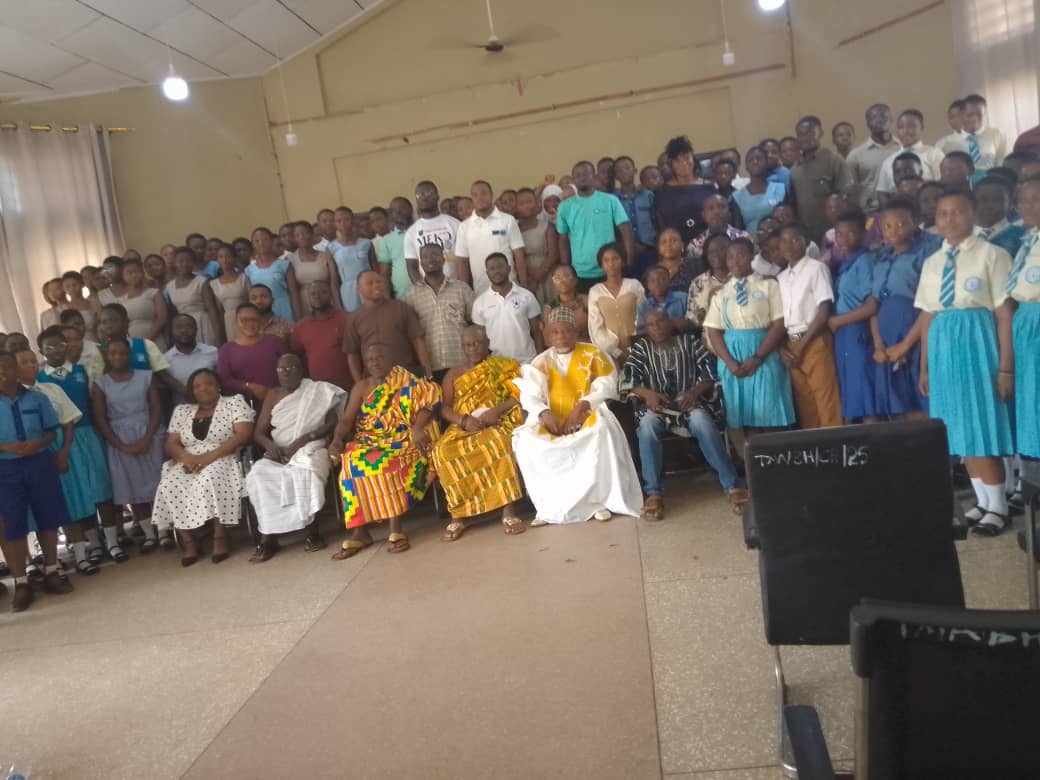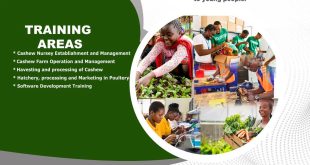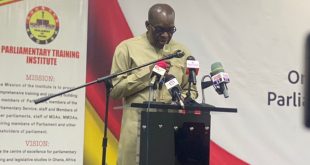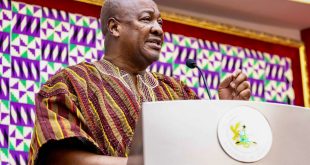The Tano Basin Secretariat of the Water Resources Commission, has conducted an education and awareness program at the Bonokyempem Hall in the Techiman South Metropolitan Assembly.
The education and awareness creation forum, was graced with the presence of representatives of the Techiman Traditional Council, religious leaders, youth groups, CSOs, learners from some selected second circle institution, media and other relevant stakeholders.
The program was aimed at educating the public on the need to protect water bodies with emphasis to the Tano Basin which is 512 kilometers from Tuobodom in the Bono East region of Ghana to the Aby Lagoon in Ivory Coast where it enters the Atlantic Ocean, featured presentations and interactive sessions that highlighted the current state of water resources in the Tano Basin and the measures being taken to address emerging challenges.
The Principal Officer of the Tano Basin who doubles as the Head of the Basin, Mr. Solomon Danso-Ankamah, educated the gathering on the Water Resources Commission’s water use regulations. He explained that, his outfit is mandated to oversee the use of water in Tano Basin communities as they provide permit for every use of water in those communities.
“We came here to engage the students, the general public, and some of our sister institutions about water resource management, specifically on the Tano River Basin. We’re looking at the laws that we have as a country, the laws that we are using to manage the water resources.
“I made mention of the have the water resource regulation, which requires that for any water use in Ghana, you need a particular permit from the water resource commission. I made mention of mining, industry, household, hydro power, irrigation, aquaculture and others.” He said.
According to him, the Water Resources Commission, is responsible for the provision of permit for companies or individuals that seeks to construct a borehole as that will enable them to track and regulate their activities.
Mr. Danso-Ankamah, further disclosed that, the Water Resources Commission have gotten cabinet approval for the buffer zone policy which will help to protect and preserve water resources while also providing benefits to local communities. He however revealed that, since the approval by cabinet’s approval in 2012, they are yet to get a Legislative Instrument (LI) to back their activities in relation to the buffer zone policy
“I also talked about the drilling license regulation which requires that for any contractor, for any person to do a borehole for somebody, that person or contractor needs a drilling license from the Water Resources Commission. Then I also talk about dam safety regulation which has to do with the design, the construction, operation, maintenance and decommission of dams in Ghana.
“So for any dam construction, you need a dam safety license or permit from the water resources commission. And I also spoke about the buffer zone policy, of which we had cabinet approval since 2012 but we are here to get the LI. That will also tell us that from a distance to a river, there shouldn’t be any activities, either development for building or filling stations, for gas stations and any other things that will have negative effects on our water resources.
“We intend to let the public know that water resource management is everybody’s business, t’s not for any particular individual institutions. We all need to collaborate to make sure that our people do the right thing so that together, we can have clean water for our socioeconomic development and also have clean water to ensure that the future generation of Ghana will have water to used without being affected by our current usage. Let’s come together to save our water resources so that tomorrow, we will not import water from other countries.” He said.
On his part, the Assistant Basin Officer of the Tano Basin Secretariat, Mr. Yaw Konadu Yiadom, explained that, his outfit has been putting in a lot of measures to ensure the protection of the Tano Basin.
He disclosed that, the Tano Basin Secretariat in collaboration with the local assemblies and other stakeholders are able to deal with individuals or group of persons that pollute the river through activities like farming along the river banks, or building structures at buffer zones.
Mr. Yaw Konadu Yiadom, however disclosed that dealing with national security issues such as galamsey activities along the river bank is not directly under their jurisdiction.
According to him, the Tano Basin Secretariat consistently advices government on galamsey activities that pollutes the Tano River but the powers to arrest and prosecute galamseyers along the river bank is the responsibility of state security agencies.
“There are laws that enforce the regulations of water resources but we at the Water Resource Commission only give permits to legally registered companies. We advice the government on the factors that have been destroying our water bodies but the power to arrest and prosecute is the responsibility of the police because we don’t have that powers.
“We do our reports, send it to our head office every quarterly and our head office briefs the minister but we don’t have the power to arrest or prosecute anybody engaged in galamsey activities that pollutes the Tano Basin and our water resources for that matter. ” He said.
Some of the learners that were present during the program, shared their takeaway with our reporter.
“What I learned is that we have to protect our water bodies The fertilizers that we use in our farming ew don’t have to use more than the quantity that is prescribed on the fertilizer and when we used cyanide and other chemicals for galamsey, it destroys our water bodies and also comes with a lot of negative effects.
“If a pregnant woman drinks water contaminated with such chemicals, it affects the unborn child and the woman will end up giving birth to disabled child. I will advised those who engage in galamsey and other activities that pollute our water bodies to stop because in the long run, it will have negative effects on our health and our children in the near future will not be healthy.” A learner told our reporter.
Another learner said, “from the program that we attended today, I learned that illegal mining has a very bad effect on our water bodies because of the chemicals that are used in mining. I also learned that the improper disposal of waste affects our water bodies, whereas those waste could have been recycled to produce better things for the country.
“For people that are destroying water bodies, my advice is that whatever we do today we will reap it tomorrow so it is better that we do what is right so that at the end of the day, all of us benefit from clean water sources.”
Source: Elvisanokyenews.com
 ElvisAnokyeNews.com Latest News, Politics, Health, Education & More
ElvisAnokyeNews.com Latest News, Politics, Health, Education & More




